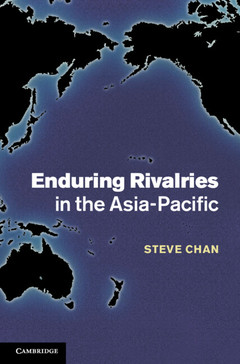Description
Enduring Rivalries in the Asia-Pacific
Author: Chan Steve
Steve Chan argues that relations between Asia-Pacific states are more stable today than at any time since 1945.
Language: English
Subject for Enduring Rivalries in the Asia-Pacific:
Approximative price 104.26 €
In Print (Delivery period: 14 days).
Add to cart
Publication date: 08-2013
246 p. · 15.7x23.5 cm · Hardback
246 p. · 15.7x23.5 cm · Hardback
Description
/li>Contents
/li>Biography
/li>
Enduring rivalries recurrently ensnare states in militarized disputes and wars. Are they poised to intensify in the Asia-Pacific, a region characterized by regime and cultural differences, territorial contests, and competing nationalist and regime claims? It is often argued that these conditions and recent power shifts are likely to lead to conflict escalation and contagion, especially in Sino-American relations. Steve Chan's book challenges this common view and argues instead that Asia-Pacific rivalries are likely to be held in abeyance. He suggests that the majority of leaders in the region wish to base their political legitimacy on their economic performance rather than popular mobilization against foreign enemies. Economic interdependence and political multilateralism have restrained and in some cases reversed rivalries. Although Asia-Pacific states will continue to quarrel, Chan argues that their relations are more stable today than at any other time since 1945.
1. What about enduring rivalries?; 2. Protracted conflicts between asymmetric dyads; 3. Interstate acrimony in the Asia-Pacific; 4. Polarity, polarization and power shifts; 5. Incentives for conflict: fuses and firebreaks; 6. Economics trumps politics; 7. Adding agency to structure; 8. Wither Asia-Pacific rivalries?
Steve Chan is College Professor of Distinction, Professor of Political Science and Director of the Farrand Residence Academic Program at the University of Colorado, Boulder.
© 2024 LAVOISIER S.A.S.
These books may interest you

India as an Asia Pacific Power 61.25 €



